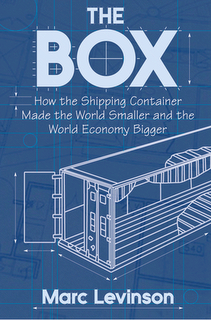Christmas Gift Suggestion - The Box
 This is a great book for all in the logsitics and transport world...it does an excellent job of portraying how Mclean forged, formed a new industry and how the eponymous title changed the supply chain, and hence our economic futures...
This is a great book for all in the logsitics and transport world...it does an excellent job of portraying how Mclean forged, formed a new industry and how the eponymous title changed the supply chain, and hence our economic futures...This is from a review at: http://www.economicprincipals.com/issues/06.04.30.html
But the story of how a trucking visionary named Malcolm McLean commenced to transform his industry in 1956 by piling fifty-eight aluminum boxes onto a ship in Newark (just fifty years ago last week) and sailing them to Houston, where fifty-eight trucks waited to haul them to their destinations, is a perfect illustration of how an idiosyncratic entrepreneur brings something new into the world, and a wonderful example of how business history can be made to sing.
Levinson shows how the path from McClean's first design to the modern shipping container was littered with mistakes. Standardization proved to be an elusive goal. Volatile fuel prices played hock both with the economics of ocean shipping and patterns of world trade. McLean himself bet the company twice, first at SeaLand in 1968, when he ordered fast new freighters, only to be clobbered by the OPEC price increases of 1973; then in the 1980s, when, as head of United States Lines, he bought big slow ships, only to be surprised again, this time by falling oil prices. (He could have used a good economist.)
Unions resisted containerization. So did railroads. A fancy consulting firm concluded in 1967 that no more than five containerships would be required to handle the trade between the US and Great Britain. No one, including McClean himself, foresaw the huge impact that sharply lower shipping costs would have on the international division of labor and the sheer volume of world trade. Looking backwards, New York University economist William Baumol ventures "The adoption of the modern shipping container may be a close second to the Internet in the way it has changed our lives." Looking forward, however, in the early 1950s, there was only the obsessively cost-conscious proprietor of a North Carolina trucking company. When McLean died at 87, in 2001, container ships around the world blew their whistles in his honor on the morning of his funeral.
I've read the book and shared it with a few colleagues. It is an excellent read...

1 Comments:
As a guy who started my business career with US Lines right out of college in 1983, I am steeped in the lore of Malcolm Mclean. I interviewed with him!
My Dad worked for USL in the early 70's when Walter Kidde owned US Lines and Sea Land was the big deal. Malcolms baby before RJR bought Sea land.
Good article Mike.
Eric Joiner
Post a Comment
<< Home